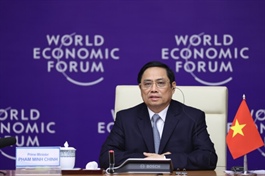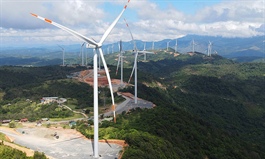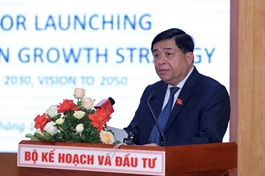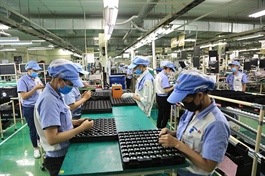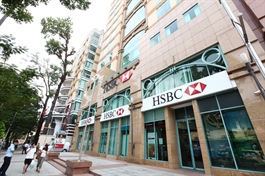PM identifies priorities for economic recovery
PM identifies priorities for economic recovery
Vietnam will continue its impressive growth in the coming decades and is firmly on track to become one of the top economies in the region, said CEO and Founder of the World Economic Forum Klaus Schwab.
Vietnam would address priorities to ensure successful economic recovery at a challenging time for both the Government and businesses.
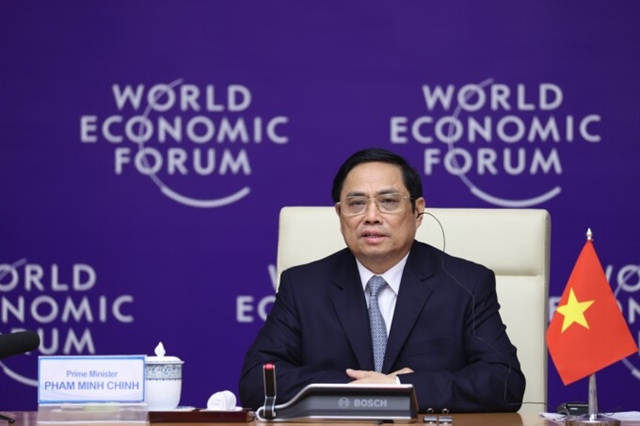
Prime Minister Pham Minh Chinh at the dialogue. Photo: VNA |
Prime Minister Pham Minh Chinh stressed the view as he co-chaired an online national strategic dialogue between Vietnam and the World Economic Forum (WEF) today [October 30], themed “Public-private partnership: The key driver for comprehensive recovery and sustainable, resilient and innovative growth.”
Sharing Vietnam’s economic recovery plan with multinationals, Chinh said the country would push for reopening of the economy in association with Covid-19 prevention; ensure social welfare and job creation; support businesses, cooperatives, and individual households to recover; upgrade infrastructure and mobilize social resources for development; improve the legal framework and enhance administrative reform.
Chinh pointed out priorities for Vietnam to initiate a socio-economic recovery in the coming time.
First and foremost, he stressed that Vietnam would strive to resume supply chains, movements of goods, safe production, and businesses during the new normal.
The government will support enterprises and people to expand business activities for economic growth and normalize social life.
Chinh also said the government would accelerate the execution of large-scale infrastructure projects, especially inter-provincial transport network, energy, digital platforms with high spillover effects to nurture new driving forces for growth.
In addition, major focus would be placed on addressing business concerns, including foreign-invested companies in Vietnam.
Chinh stressed the enhancement of the quality of legislation to stay in line with international standards, which remains a prerequisite and among three breakthrough strategies for economic development in the next 10 years.
Meanwhile, the most important one, is to develop the quality workforce, not only as of the main beneficiary but also as the ultimate goal of development. Vietnam would accelerate economic restructuring for greater productivity, quality, and efficiency in the post-pandemic period.
According to Chinh, the current pandemic situation is posing huge challenges for both the Government and enterprises, noting public-private partnership (PPP) is the right solution to overcome this difficult period for mutual benefits.
“Once the pandemic is contained, the Vietnamese Government is determined to recover the economy and realize its desire for prosperity,” he said.
Chinh called on investors to accompany the Government in pursuing solutions for safe production at industrial parks or economic zones to keep the supply chains intact.
“The Vietnamese Government stands ready to hold dialogue and cooperate with the private sector under the PPP mechanism to promote the participation of all economic components during the development process,” he continued.
The prime minister expected ongoing PPP programs in sustainable agriculture would be expanded to other sectors, while the Vietnam-WEF national strategy dialogue would become an annual event with the participation of the Vietnamese Government, businesses, and experts.
According to Chinh, Vietnam has gradually contained the pandemic and opened the economy. During the ten-month period, FDI commitments to Vietnam rose by nearly 12% year-on-year, and the actual disbursed capital stood at over $15 billion.
In addition, exports rose by 17% year-on-year, along with revenue from retail sales and services expanding by over 18%.
“Such results showed difficulties are only temporary and all the fundamentals for Vietnam’s economy continue to stay intact,” he said.
At the dialogue, the foreign business community suggested Vietnam continue promoting digital transformation and policies based on the Industry 4.0 to respond to the pandemic and recover.
They welcomed Vietnam’s resolve in realizing the commitment to a society of carbon neutrality by 2050.
Klaus Schwab, CEO, and Founder of the WEF expressed his belief in the prospects and the growing presence of Vietnam in the international arena, stressing the organization’s commitment to providing the utmost support for the Vietnamese Government.
Schwab said the Prime Minister and the Government have worked tirelessly to protect public health and the people’s livelihoods.
He expected Vietnam will continue its impressive growth in the coming decades and is firmly on track to become one of the top economies in the region.
National strategy dialogue with Vietnam is one of the most important agendas of the WEF in 2021 to support multinationals expanding businesses and investment activities globally.





